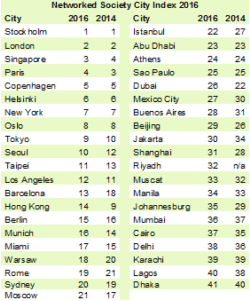 The Johannesburg has been ranked as the top city in Africa in terms of sustainable urban development and ICT maturity.
The Johannesburg has been ranked as the top city in Africa in terms of sustainable urban development and ICT maturity.
Networked Society City Index 2016 highlights
This year’s index found a positive correlation between social and economic development and increasing ICT maturity. ICT is not only critical to socioeconomic progress, but can help decouple this progress from an increased environmental footprint in favour of more sustainable development.According to Ericsson, smart city planning will be critical to achieving several of the United Nations Sustainable Development Goals (SDGs). For example, cities will be instrumental for the advancement of climate action, poverty reduction, better health and education, as well as improved social and financial inclusion.
A number of actions are essential for cities to go beyond smart cities of today and become more sustainable: including ICT as a basic infrastructure in the investment plans; creation of enabling regulatory environments that encourage the adoption of ICT; holistic approaches to integrating ICT across various sector planning, such as transport, energy and public safety; and collaboration between cities.The future of smart cities
Erik Kruse, Head of Ericsson Networked Society Lab, says: “Many smart city initiatives to date have mainly used ICT to optimize existing systems and behaviours, for example, intelligent transport. “Instead, cities need to rethink existing structures to fully grasp the potential of ICT to make sure that ‘smart’ is in fact sustainable. The future Networked Society city is characterised by resiliency, collaboration, participation and mobility, which are essential for ensuring our cities are attractive, sustainable and vibrant places.”






